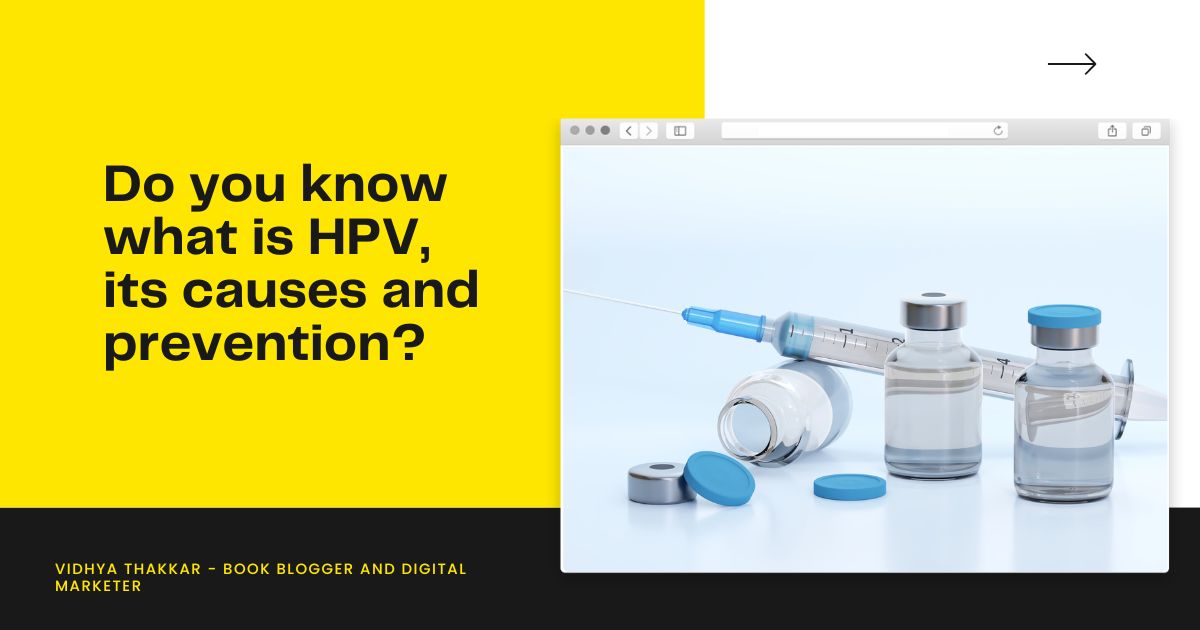I believe life is full of freedom and exploration. I go about my work and follow my passion projects! A work-life balance is important, yes, and so is taking care of our health as we want to give our best to every endeavor of ours.
Regular health check-ups are a great way to ensure everything is right. This of course, is also the time to talk to your doctor about any infections one has to be careful about. Who knows what you may learn!
I too discovered several startling and vitally essential pieces of information recently from my gynaecologist which I wish to share with all. I am doing so as I feel it is of utmost importance. Knowledge is always the first step to precautions and prevention, especially in case of infections.
I have been following news about health especially when it comes to feminine health and learned that HPV is something we should know about. I then spoke to my doctor, and through this blog post, I want to talk about key information and statistics related to HPV aka the Human papillomavirus, one of the most commonly transmitted viral infections of the reproductive tract which is responsible for 99% cervical cancer cases.1 Through this article, I not only wish to share about HPV infection but also provide insights into why we should opt for methods to prevent HPV.
Human papillomavirus is a Sexually Transmitted Infection (STI). 1 In fact, nearly all sexually active people can be infected with it at some point in their life.
Although there are more than 100 types of HPV, it can be categorized primarily into high-risk (cancer causing) and low-risk (non cancer causing) HPV types.4 Out of the 100 types, at least 14 are in the high-risk subcategory.4
HPV is the cause of almost all cases of cervical cancer and is also responsible for vulvar vaginal and anal cancers in women.2
Every 5 minutes, nearly 1 individual loses their life to HPV-related cancers!2
HOW IS HPV TRANSMITTED?
ORAL, VAGINAL, AND ANAL SEX WITH INFECTED PERSON: One of the most common ways HPV is transmitted is if one has vaginal, anal, or oral sex 4 with someone who is infected with HPV. Intimate, skin-to-skin contact 5 that occurs during these types of sexual activity is one of the main causes of HPV transmission. Infection can spread even when an infected person shows no signs or symptoms of the same.
It is important to note here that having sex with a single partner may also put you at risk for HPV, as one can develop symptoms even years after you have had sex with someone infected.5
WEAK IMMUNITY: Illness, conditions like the presence of HIV (Human Immunodeficiency Virus), or even consumption of immuno depressant medications can lead to the overall weakening of one’s immunity, thereby causing one to become highly susceptible and prone to it.3
AGE: Yes, this is a contributing cause for HPV infection. Say, for instance, genital warts, which are a common occurrence in teens or even young adults can become a breeding ground and thereby cause the spread of HPV. It is important to note here that in case of skin damage to a person, warts are more likely to occur at the spot where the skin has been cut open/damaged thereby making that individual highly prone to getting warts and thereby becoming the potential breeding spot for HPV.3
INFECTED SURFACES: Imagine if an infected person or one having such skin warts goes to a public utility /shared utility area like a shower or swimming pool. He/she can increase the likelihood of the spread of HPV infection by (unknowingly) infecting these places.3
WHAT ARE THE SYMPTOMS?
HPV Infection usually shows no symptoms. It functions silently and so it’s hard to know that one has been infected. However, HPV may manifest in diseases of pre-cancer abnormalities which may show symptoms either 2-3 months or years after being infected.
CAN HPV BE TREATED?
Technically, there is no treatment for the virus itself.4 However, thanks to the advancement of technology and the prevalence of ultra-modern medicine available in today’s times, there is a preventive vaccine available for it. Please do contact your doctor for more information related to the same.
It is pivotal also to note here that albeit there is no treatment for the virus itself, diseases like Genital warts,and HPV-related cancers have individual treatments. However this means the infection has progressed into a disease/cancer stage, which actually can be prevented.
HPV PREVENTION
So, the thin and thick of it here is that, at some point in time, every one of us is highly susceptible to HPV. So, what is the solution? How do we avoid contracting HPV?
Simple. For starters, it is important to understand that you have to first be open-minded and talk about it. Getting informed and educating yourself is the primary way you shall be protecting yourself against contracting it. Do not hesitate to speak to your doctor about it, get education as well as information about it as well as get the preventive vaccine available for HPV.
Have safe sex. Also, use proper protection. Condoms and dental dams ate good protection against infections. Remember, your actions are directed at not only safeguarding your own life but also the lives of someone else.
We, especially, the women of today, who are the torch bearers as well as the trailblazers of a safe, secure tomorrow should consider that 80% of us who are sexually active, could be infected by HPV at least once in our lifetime.12 It is important to know HPV causes and keep a check on our health by going for regular cervical screenings like getting a Pap smear.
Be responsible, and educate not only yourself but also others about HPV. Remember, your actions and your awareness can help build a better, healthier, and safer tomorrow.
For more information on HPV and its prevention, talk to an expert on https://bit.ly/knowmorehpv/
References
1. National Health Portal,
https://www.nhp.gov.in/disease/communicable-disease/human-papillomavirus-hpv-infection-and-cervical-cancer, accessed on 5 March 2016
2. HPV Center https://hpvcentre.net/statistics/reports/IND_FS.pdf, accessed on March 2022
3. National Cancer Institute,
https://www.cancer.gov/aboutcancer/causesprevention/risk/infectious-agents/hpv-and-cancer, OCT 2021
4. World Health Organisation. Factsheet. Human papillomavirus (HPV) and cervical cancer,
https://www.who.int/news-room/fact-sheets/detail/cervical-cancer, 3 March 2021
5. American cancer society
26 October, 2021
6.Centers For Disease Control & Prevention
https://www.cdc.gov/condomeffectiveness/latex.html, assessed March 2022


